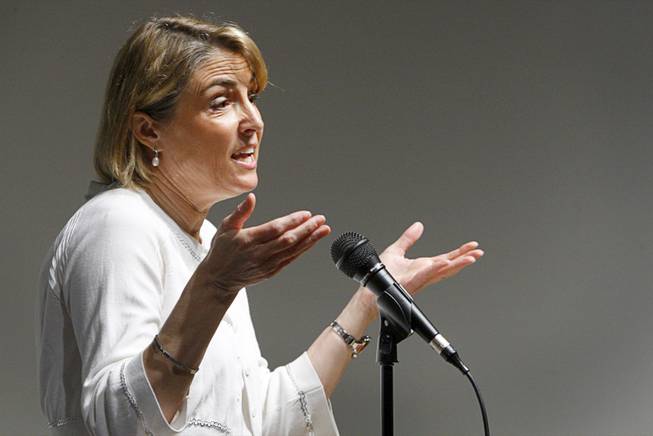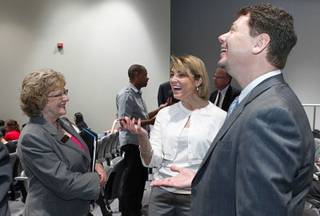
State Treasurer Kate Marshall speaks to students at East Career and Technical Academy Wednesday, April 18, 2012. Marshall announced that her office is sponsoring a financial literacy pilot program in several Nevada high schools, as well as one middle school. The program is being administered by 12 teachers and encompasses more than 900 students.
Thursday, April 19, 2012 | 2 a.m.
Related stories
Sun Archives
In a town that thrives on visitors throwing financial caution to the wind and sticking that extra dollar in the slot machine, a new program is aiming to teach high school students the importance of managing their money responsibly.
The Nevada State Treasurer’s Office is launching a financial literacy pilot program at nine Clark County high schools and one middle school. An additional high school in Washoe County is also included in the pilot.
The program will teach 1,000 students the basics of budgeting, earning income, saving for college and investing.
“You have to have control of your money and not let it control you,” state Treasurer Kate Marshall told an auditorium of students Wednesday morning at the East Career and Technical Academy.
Marshall started her presentation with an anecdote from her past, describing how her father kept track of the family’s finances by putting his bills in a cigar box. If the bills became too much to pay, the family would move and start over, she said.
“I wouldn’t recommend it,” Marshall said of her father’s bookkeeping method.
Financial literacy is a critical skill for students to learn, Marshall said, but the decline in the popularity of home economics or consumer science classes means many students aren’t getting the knowledge they need.
The pilot program, which started Friday and will run for five weeks, is being taught by business, computer science, math and politics teachers at the schools. The curriculum is based on a national model created by the national Council for Economic Education, Marshall said.
The pilot will cost about $10 per student, for a total budget of $10,000, Marshall said. The program does not rely on taxpayer dollars and instead is funded using program fees paid to the state by private investment management companies that participate in the Nevada College Savings Plan program.
Students enrolled in the financial literacy program took a pretest last month to measure their level of financial literacy. The average student was only able to correctly answer 21 out of 50 questions on the test, underscoring the need for the program, Marshall said.
Students will take another test after completing the program, and if significant gains are made, Marshall eventually hopes to expand the program to other schools across the state.
“I hope that by learning these lessons,” Marshall said, “(students) will have more control in their lives.”


Join the Discussion:
Check this out for a full explanation of our conversion to the LiveFyre commenting system and instructions on how to sign up for an account.
Full comments policy